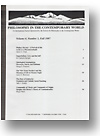|
articles |
|
1.
|
Philosophy in the Contemporary World:
Volume >
4 >
Issue: 3
James A. Clark
Wallace Stevens:
A Portrait of the Artist as a Phenomenologist
abstract |
view |
rights & permissions
| cited by
Confusing modern poetry with philosophy is a common fault of literary criticism. Yet, the work of some poets can benefit critically from philosophical interpretations. Wallace Stevens is a poet who manifested an abiding interest in philosophy. His poems consistently display, in both their syntax and modulation of thought, philosophical parallels. Stevens’ dominant mode of thought is phenomenological. This can be shown by analyzing parallels between phenomenological methodology and Stevens’ poetry. Particularly three poems---“Thirteen Ways of Looking at a Blackbird” (1917), “The Snow Man” (1921), and “The Latest Freed Man” (1938)---embody, respectively, the poem as doing phenomenology, the poem as a description of the phenomenological mind, and the poem as a portrait of the phenomenologist
|
|
|
|
|
2.
|
Philosophy in the Contemporary World:
Volume >
4 >
Issue: 3
M. Carmela Epright
Impartialism, Care, and the Self
abstract |
view |
rights & permissions
| cited by
In this paper, I discuss the ethics of care as a response to impartialist ethical theories. In section 1, I contrast Gilligan’s critique of impartial ethical theories with other objections to impartialism. In section 2, I analyze some of the ways in which impartialists have attempted to understand the ethics of care since the publication of Gilligan’s text. In section 3, I argue against proponents of impartialism and show that care constitutes an ethical theory in its own right, not one which is dependent or parasitic upon impartialism. In section 4, I contrast care ethic’s conception of the self with that offered by traditional ethical theories, and argue that the most important distinction between the care and impartialist accounts of morality lies in the conception of the moral self which informs each of these approaches.
|
|
|
|
|
3.
|
Philosophy in the Contemporary World:
Volume >
4 >
Issue: 3
Gregg E. Franzwa
Ontological Assumptions:
Descartes, Searle, and Edelman
abstract |
view |
rights & permissions
| cited by
The proposition that there is a purely causal explanation of subjective states of human consciousness is a philosophical one. The affirmation of such a proposition must be a premise to research. And the justification for such a premise will be found in part in the fundamental ontological assumptions of the researcher. By examining the assumptions of Rene Descartes, at the beginning of the scientific age, I hope to show a similar set of assumptions behind the thought of two recent contributors to the debate, John Searle and Gerald Edelman. I will conclude that a crucial question is begged by all three.
|
|
|
|
|
4.
|
Philosophy in the Contemporary World:
Volume >
4 >
Issue: 3
Larry D. Harwood
The View from Nowhere and the Meaning of Life in Thomas Nagel
abstract |
view |
rights & permissions
| cited by
Thomas Nagel contends that the actual philosophical problem in the meaning of life is the independent world we live in, and only requires a self-transcendent being who glimpses an independent world. I argue that Nagel is mistaken to think that self-transcendence evokes the same anxiety for humans living in the world of Dante as Darwin. Nagel’s view from nowhere is rather a modem version of the world. Secondly, while I concede that there is a common anxiety felt by self-transcendence in glimpsing an independent objective world, we also view that world through a set of beliefs that conditions how we see that world.
|
|
|
|
|
5.
|
Philosophy in the Contemporary World:
Volume >
4 >
Issue: 3
Sally J. Scholz
The Duty of Solidarity:
Feminism and Catholic Social Teaching
abstract |
view |
rights & permissions
| cited by
Catholic Social Teaching of late has a lot more in common with feminist moral theory than might be evident at first glance. After a brief explanation of Catholic Social Teaching’s duty of solidarity, and a look at some of the feminist critiques of this solidarity, I point out some of the significant similarities between feminist ethics and the duty of solidarity. The last section focuses on community and care, the epistemological role of experience and the world view of the other, the centrality of self-determination, and the final goal of both the duty of solidarity and feminist ethics: liberation from oppression.
|
|
|
|
|
6.
|
Philosophy in the Contemporary World:
Volume >
4 >
Issue: 3
Roger Ward
Community of Choice and Community of Origin:
Insights into Dewey’s Theory of Communication
abstract |
view |
rights & permissions
| cited by
This essay unearths the meaning of community in John Dewey’s Experience and Nature, using Marilyn Friedman’s terms “community of choice” and “community of origin.” The authority of communication as determinative of Dewey’s community comes out. In fact, communication seems to be the philosophical point of Dewey’s descriptions in that book which reveals his anticipation of a community wherever communication obtains. Dewey is shown, in conclusion, to call us beyond communities of choice or origin to a community of authority which holds both peculiar promise for, and demands of, individuals.
|
|
|
|





